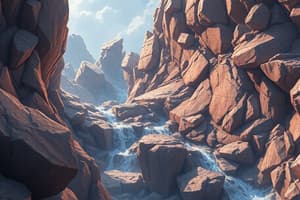Podcast
Questions and Answers
What is the process that can drastically alter rocks over short and long periods of time?
What is the process that can drastically alter rocks over short and long periods of time?
- Deposition
- Erosion
- Weathering (correct)
- Crystallization
Which type of geological processes originate from within the Earth itself?
Which type of geological processes originate from within the Earth itself?
- Erosional
- Exogenic
- Endogenous (correct)
- Exogenous
What is the expected outcome after going through the learning material on weathering and Earth's interior?
What is the expected outcome after going through the learning material on weathering and Earth's interior?
- Mastering the art of volcano prediction
- Knowing how to prevent erosion
- Describing how rocks undergo weathering and explaining why Earth's interior is hot (correct)
- Understanding how to identify rocks
What should students do if they encounter difficulties while proceeding with the lessons and activities?
What should students do if they encounter difficulties while proceeding with the lessons and activities?
Which activity should students not proceed with until they are done with the previous topic?
Which activity should students not proceed with until they are done with the previous topic?
What are students expected to do if they need a little assistance with the learning material?
What are students expected to do if they need a little assistance with the learning material?
What is the main effect of frost wedging on rocks?
What is the main effect of frost wedging on rocks?
What type of weathering is akin to physical change that breaks rocks down into bits due to physical force?
What type of weathering is akin to physical change that breaks rocks down into bits due to physical force?
What is the process where overlying rocks at the surface are removed, causing the underlying rocks to expand and fracture?
What is the process where overlying rocks at the surface are removed, causing the underlying rocks to expand and fracture?
Which factor is NOT involved in the weathering of rocks?
Which factor is NOT involved in the weathering of rocks?
What causes rocks to expand and fracture when exposed to high temperature?
What causes rocks to expand and fracture when exposed to high temperature?
In which type of region is frost wedging most prevalent?
In which type of region is frost wedging most prevalent?
What is the outcome of physical or mechanical weathering on rocks' chemical composition?
What is the outcome of physical or mechanical weathering on rocks' chemical composition?
What leads to the formation of potholes in roads during winter?
What leads to the formation of potholes in roads during winter?
"What is one of the processes that lead to soil production?"
"What is one of the processes that lead to soil production?"
What happens when the pressure diminishes from overlying rocks at the surface?
What happens when the pressure diminishes from overlying rocks at the surface?
Flashcards are hidden until you start studying
Study Notes
Geological Processes
- Geologic processes can drastically alter rocks over short and long periods of time
Internal Geological Processes
- Processes that originate from within the Earth itself are referred to as internal geological processes
Learning Objectives
- After completing the learning material on weathering and Earth's interior, students are expected to have a thorough understanding of the topics
Academic Support
- Students who encounter difficulties with the lessons and activities should seek assistance from their teachers or peers
- If students need a little assistance with the learning material, they should review the previous topics and seek help when needed
Weathering Processes
- Frost wedging is a process that causes rocks to expand and fracture due to the freezing of water in cracks and crevices
- Mechanical weathering is a type of weathering that breaks rocks down into bits due to physical force, similar to physical change
- Exfoliation is the process where overlying rocks at the surface are removed, causing the underlying rocks to expand and fracture
Factors Affecting Weathering
- Living organisms are not involved in the weathering of rocks
- High temperature causes rocks to expand and fracture when exposed to it
Frost Wedging
- Frost wedging is most prevalent in cold regions
- Frost wedging leads to the formation of potholes in roads during winter
Chemical Composition
- Physical or mechanical weathering does not alter the chemical composition of rocks
Soil Formation
- One of the processes that lead to soil production is mechanical weathering
Exfoliation
- When the pressure diminishes from overlying rocks at the surface, the underlying rocks expand and fracture
Studying That Suits You
Use AI to generate personalized quizzes and flashcards to suit your learning preferences.




